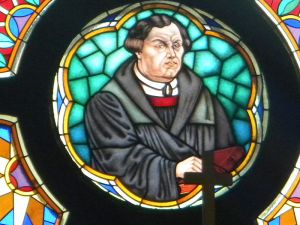So maybe Luther had some good points (careful Mr. Douthat….). But will God (and perhaps the Church at large?) vindicate Him for His actions (as we hear endlessly: unleashing thousands of denominations, each man his own Pope…)? Over at my own blog, theology like a child, I have been re-cycling previous posts on the Reformation. Here is a summary of my 2012 series The Coming Vindication of Martin Luther (this was “Part V”)
I invite challenges to the account and argument that I provide here:
Preface … Part V, Part IV, Part III, Part II, Part I
Note: As noted in the preface to this series, I will be doing these posts every other day in opposite order, starting with part V, and working back to part I (please note that the links in this post to parts I-IV will only work when all parts have been posted).
Ideally, the Church should not only be a vehicle for faith but an object of faith, as Richard John Neuhaus once put it (from here). This is easy for children of course (see 1 below). In other words, we should be able to have confidence in the Church and what it teaches at all times. History, however, has shown us that what ought to be is not always what is (see 2 and 3 below) The Lutheran Reformation is all at once an event to be celebrated and a tragic necessity (see 4 below)
Again, we begin at the end.
In part IV we saw how three persons – or perhaps just one – with the truth can and must stand up against all others. Putting aside the matter of whether or not Martin Luther was correct in his teaching of confession and absolution (see 5 below, as well as 6 and 7 below), the Eastern Orthodox historian and theologian Olivier Clement does seem to be surprisingly close to Luther regarding the matter of how authority should work in the church (i.e. the “consensus principle of church authority” noted in part III). While Luther’s colleague Melanchton wrote in the Tractate (a part of the Lutheran confessional documents) that even if the pope was pope by divine rite (vs. Romans 13-style human rite) he would still need to be opposed if he contradicted the doctrine of justification (see 8 and 9 below), Luther always seemed far less likely to use these kinds of “even-if-we-concede” kinds of arguments. That said, had Luther had a chance to be exposed to reasoning like Olivier Clement’s in his book “You are Peter”, I think he may have recognized a reasonable churchman that he could potentially do some business with (assuming Clement, evaluating Luther’s view of confession and absolution, was of the same mind towards Luther)!
In Part III, we learned how early on, Luther acknowledged as authoritative the decisions clearly established by both pope and council in the canons of the church – while also countering those who in their ignorance of canon law would uphold the pope even when he contradicted Scripture. He used the argument of the canon lawyer Panormitanu (Nikolaus de Tudeschis, d. 1445), stating that the judgment of an individual Christian in matters of faith, when based on Scripture, takes precedence over all other church authorities (again, see 8 and 9 below, and also 4 below)

In Part II, we saw that Luther’s internal struggle with confession was very much related to papal authority. In the 15th century “Gerson had argued that it was not a mortal sin to disobey the laws of the church unless the disobedience was deliberate. When Luther applied this argument to the practice of confession, it meant that he and other Christians were not under pressure to confess every sin” (Hendrix, Luther and the Papacy, 1981). Luther contended that the priests were badly mistaken if they thought they absolved only those Christians whose genuine contrition could be proved. On the contrary, faith in Christ through the word of the priest brings forgiveness to whoever trusts in that word (again see 5 below, as well as 6 and 7 below).
In part I we learned that “few have questioned… that Luther recognized the necessity of a visible human hierarchy, established by divine right, to guarantee the stability and permanence of the church.” (Hendrix, p. 13) Also, Luther “said that he came to his struggle with the pope quite innocently”, noting that twenty years before he realized that the papacy was the Antichrist he never would have entertained such a notion (p. 6) As he said: “Although much of what they said seemed absurd to me and completely alien to Christ, yet for more than a decade I curbed my thoughts with the advice of Solomon: ‘Do not rely on your own insight’ [Prov. 3:5].” (p. 3)
Although I cannot locate a specific quotation, at one point I had heard that Pope Benedict encouraged his fellow Roman Catholics to read the early Luther, when Luther was still genuinely catholic (update: Thanks James Swan!) The problem with this, of course, is that the core theological convictions of the “early Luther” were part and parcel of his later protest. One cannot readily separate Luther the responsible RC theologian from Luther the Church reformer, for the theology drove the reform.
Now of course, I do not want to discourage such developments, but speaking honestly, it is very difficult for me to understand how Roman Catholic theologians who are familiar with Luther think that his early pre-Reformation works will end up helping their cause! It seems to me that the crises of indulgences became particularly clear for Luther precisely because of the theologian he had become, and he was absolutely determined to “refute the opinions of the ‘new’ scholastic doctors concerning the efficacy of indulgences” (Hendrix, p. 35) And from this starting point, it was only a matter of time before Luther was able to identify and articulate ever more clearly how the related issues of sacramental penance and absolution (see 10, 11 and 12 below) had been wrongly taught by the Roman hierarchy (as he found that the problem went deep, i.e. Aristotle vs. Bible – see 13 and 14 below [also see this post dispelling myths about the Lutheran view of “Sola Scriptura”]). One link in the chain led to another which led to another – until Luther was able to see clearly the very heart of the matter: that is, the essence of the Gospel itself. The controversy regarding indulgences had brought him there.
It may seem as if I am eager to focus on the negative – the things that we do not hold in common (by the way, Lutherans are very different from the Reformed to! – see 15). May it never be! Rather, I contend that, in general, our orientation should be to furiously emphasize our commonalities and to furiously emphasize our honest differences, because the truth not spoken – or rarely spoken – in love is not the fullness of love at all. Even some in the unbelieving world know as much! Do you, like me, think of the pagans’ words recorded by Tertullian: “See how they love one another!”? I say yes! Let us aim to love one another in truth as we patiently work through the tragic reality that there must be differences among us – to reveal who has God’s approval!
I close with words from Pope Benedict, speaking of Luther’s “Christ-centered spirituality”: “’This God has a face, and he has spoken to us. He became one of us in the man Jesus Christ – who is both true God and true man,’ explains Pope Benedict. According to Luther, Christ is the interpretative center of the Bible, notes Benedict, which presupposes ‘that Christ is at the heart of our spirituality and that love for him, living in communion with him, is what guides our life.’” (from here ; note also the high praise Luther has received from other Roman Catholics – see 16 below)
Amen to that. I hope you will join me for parts I-IV.
FIN
Previous posts dealing with the topic of the Lutheran Reformation vis-a-vis Rome:
- Re: Reformation Day: kids don’t celebrate divorce
- Unchildlike Reformation Eve
- A child of the Reformation
- Reformation history: what would you have done?
- Forgiveness free and true: the crux of the Reformation, the essence of the Christian life
- Joan of Arc faith vs. infant faith (part 1 of 2)
- Joan of Arc faith vs. infant faith (part 2 of 2)
- Babies in Church (part VIII): judge your mother, o child (the tragic necessity of the Reformation)
- Round 3 with RC apologist Dave Armstrong: A few good Pharisees
- The Roman penitential system and the emergence of Reformation doctrine (part I of II)
- The Roman penitential system and the emergence of Reformation doctrine (part II of I
- The Roman penitential system and the emergence of Reformation doctrine – extra 1
- Knowledge first and foremost: baby King David vs. adult St. Thomas
- Update on my humble contributions to honest ecumenical dialogue
- RC convert Jason Stellman’s perception of Lutheranism
- Martin Luther, Roman Catholic prophet
Picture from http://en.wikipedia.org/wiki/Martin_Luther












